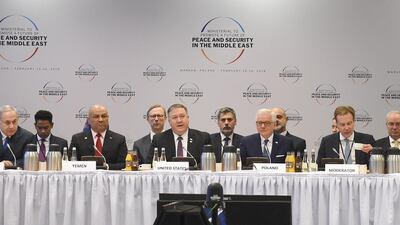It may or may not have been an accident. On Thursday, Yemen’s foreign minister was pictured sitting directly next to Israeli Prime Minister Benjamin Netanyahu at the opening session of the second day of the US-hosted summit on the Middle East in Poland.
The moment was lauded by the Israeli press as “historic” for two countries without diplomatic relations to be sat together, even though the photo shows the icy body language of Yemeni Foreign Minister Khalid Al Yamani when the Israeli premier took his seat.
Mr Netanyahu on Wednesday sat alongside the Yemeni official at a top table that included at the other end Jared Kushner, the US president's special adviser and author of a much-anticipated peace plan for the Middle East.
But there was more to the situation that met the eye, according to a senior Yemeni official present. It was in fact an apparent diplomatic faux-pas forced upon Yemen's top representative by US officials, with no willingness on Mr Al Yamani's part.
"American representatives brought Mr Netanyahu over to sit next to the foreign minister [Mr Al Yamani] … his team were seated far away from him, none of the Israeli representatives were around him," the Yemeni government source told The National.
Polish representatives were “embarrassed and angry” as this was not part of the protocol, the source said.
“They even asked Mr Netanyahu to change his seat during the session but it was too complicated for him to move,” the source continued.
Mr Netanyahu is lobbying for improved ties with Arab states amid troubles at home. He has said several times in recent months that ties have never been better despite few Middle Eastern countries having relations with Israel. His claims have come.
He did not even have a working microphone, the official said. Instead, Mr Netanyahu had to lean over to speak into Mr Al Yamani’s device to be heard.
With an election to win, Mr Netanyahu was already on manoeuvres shortly after and grabbed hold of Mike Pence for a chat almost as soon as the official family photo call started to break up.
The US Special Representative for International Negotiations, Jason Greenblatt, described the moment between the two officials as “light hearted".
If confirmed, the move would be Mr Netanyahu’s second gaffe in as many days. On Wednesday evening, the Israeli leader appeared to misspeak when he said the meeting would “advance the common interest of war with Iran”.
A social media post of the clip was later retracted and Israeli statements changed the comments to “combatting Iran” but it had already caused a stir.
Keeping matters professional, Mr Al Yamani stuck to the agenda when he later tweeted his message of the day.
“We interacted with world leaders at a roundtable, as we always do, and conveyed the vision of President Abdrabbu Mansour Hadi, to solve the Yemeni crisis by curbing Iranian expansionism,” Mr Al Yamani said on Twitter.
The ministerial meeting discussed mechanisms to confront Iranian threats in the region, Mr Al Yamani said.
If Iran was the topic of the day at the Warsaw Conference, then Yemen ran a decent second in the race for the limelight.
Making a premature departure before the close of proceedings, British Foreign Minister Jeremy Hunt sent a video message about Yemen on Twitter from the cockpit of his plane as it left the airport.
He spoke of his concern that the Stockholm agreement wasn't completed months after it was sealed. He said the four-country meeting convened on Wednesday evening could yet lead to a breakthrough.
"The basic situation is that it's possible that Hodeidah could finally be cleared if Houthi troops withdraw in the next few days and that will be an important step forward in the implementation of the Stockholm agreement," he said.
"However if it that doesn't happen there is real frustration and impatience that it is taking so long. So this is really a crunch moment in the Yemen process."
A peace agreement, brokered through UN-led talks in Sweden between Yemen's internationally recognised government and Houthi rebels, calls for a truce and the withdrawal of all forces from the city and its ports.
But the government and the Saudi-led coalition supporting it have recorded hundreds of rebel violations since it came into effect on December 18.

